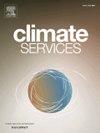控制地点和限制性规范对西非塞内加尔农民支付气候信息服务意愿的作用
IF 4.5
3区 环境科学与生态学
Q2 ENVIRONMENTAL SCIENCES
引用次数: 0
摘要
气候变化给撒哈拉以南非洲的小农带来了挑战。农民需要帮助他们适应的工具,例如气候信息服务(CIS),以提高抵御能力和农业生产力。本研究调查了塞内加尔ssamdhiou和Tambacounda地区农民购买季节性CIS的支付意愿。该研究探讨了地区差异以及社会经济、心理和性别相关因素的作用。采用混合方法,采用概率随机抽样的方法对708名农户进行数据采集。采用Becker-DeGroot-Marschak (BDM)机制诱发WTP。通过回归分析和中介分析来评估对WTP的直接和间接影响。调查结果显示,独联体的平均WTP为1560非洲法郎(2.6美元),36.7%的农民出价高于市场价格,表明对独联体的需求强劲。年轻农民和妇女WTP较高。高昂的生产成本和有限的信贷渠道减少了投标金额。一项实验性信息干预显著增加了投标金额,突出了意识在塑造需求方面的关键作用。中介分析显示,内部控制点(LoC)对WTP的中介作用不显著,表明农民个人控制信念对其经济决策影响不大。然而,限制性的性别规范对WTP产生了负面影响,强调了基于性别的限制如何减少对CIS的需求。这些调查结果强调需要有针对性的政策来促进独联体的采用,包括提高认识运动,行为和性别敏感的独联体交付形式,以及负担得起的金融服务。通过解决经济和行为障碍,政策制定者可以通过改善获取气候信息的途径来提高抵御力和农业生产率。本文章由计算机程序翻译,如有差异,请以英文原文为准。

The role of locus of control and restrictive norms on farmers’ willingness to pay for climate information services in Senegal, West Africa
Climate variability challenges smallholder farmers in sub-Saharan Africa. Farmers need tools to help them adapt, such as climate information services (CIS) to enhance resilience and agricultural productivity. This study investigates farmers’ willingness to pay (WTP) for seasonal CIS in Senegal’s Sédhiou and Tambacounda regions. The research explores regional differences and the role of socioeconomic, psychological, and gender-related factors. Using a mixed-methods approach, we collected data from 708 farmers through probabilistic random sampling. The Becker-DeGroot-Marschak (BDM) mechanism was employed to elicit WTP. Regression and mediation analysis were conducted to assess direct and indirect effects on WTP. The findings reveal an average WTP of 1,560 CFA (2.6 USD) for CIS, with 36.7% of farmers bidding above the market price, suggesting strong demand for CIS. Younger farmers and women showed higher WTP. High production costs and limited access to credit reduced bidding amounts. An experimental information intervention significantly increased bid amounts, highlighting the critical role of awareness in shaping demand. Mediation analysis showed that internal locus of control (LoC) does not significantly mediate WTP, suggesting that farmers’ belief in personal control has little impact on their economic decisions. However, restrictive gender norms negatively mediated WTP, underscoring how gender-based constraints reduce demand for CIS. These findings emphasize the need for targeted policies to promote CIS adoption, including awareness campaigns, behavioral and gender-responsive CIS delivery formats, and affordable financial services. By addressing both economic and behavioral barriers, policymakers can improve resilience and agricultural productivity through improved access to climate information.
求助全文
通过发布文献求助,成功后即可免费获取论文全文。
去求助
来源期刊

Climate Services
Multiple-
CiteScore
5.30
自引率
15.60%
发文量
62
期刊介绍:
The journal Climate Services publishes research with a focus on science-based and user-specific climate information underpinning climate services, ultimately to assist society to adapt to climate change. Climate Services brings science and practice closer together. The journal addresses both researchers in the field of climate service research, and stakeholders and practitioners interested in or already applying climate services. It serves as a means of communication, dialogue and exchange between researchers and stakeholders. Climate services pioneers novel research areas that directly refer to how climate information can be applied in methodologies and tools for adaptation to climate change. It publishes best practice examples, case studies as well as theories, methods and data analysis with a clear connection to climate services. The focus of the published work is often multi-disciplinary, case-specific, tailored to specific sectors and strongly application-oriented. To offer a suitable outlet for such studies, Climate Services journal introduced a new section in the research article type. The research article contains a classical scientific part as well as a section with easily understandable practical implications for policy makers and practitioners. The journal''s focus is on the use and usability of climate information for adaptation purposes underpinning climate services.
 求助内容:
求助内容: 应助结果提醒方式:
应助结果提醒方式:


